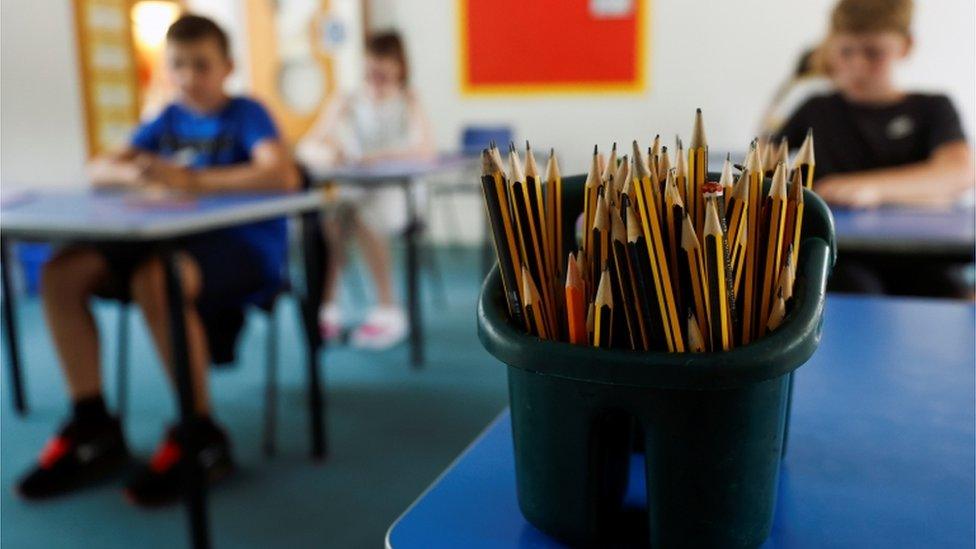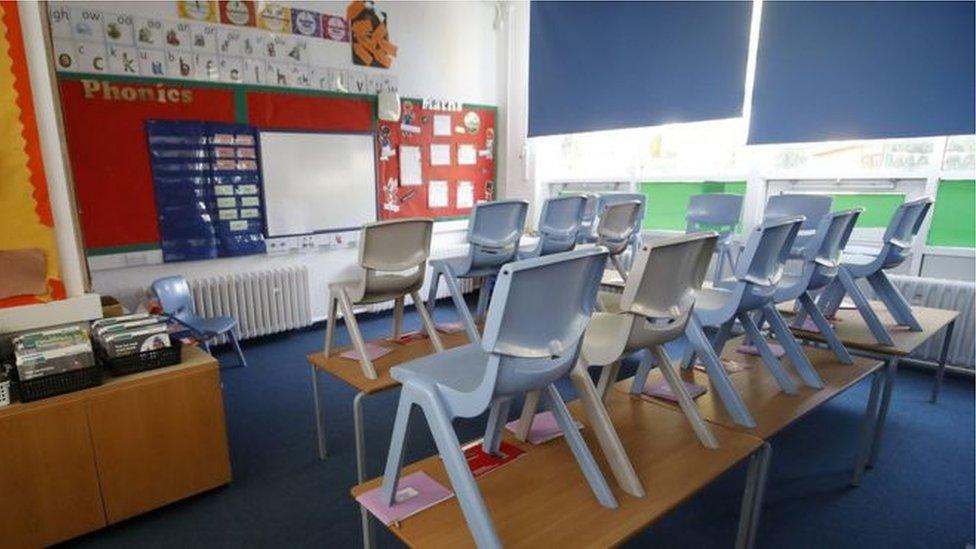Special educational needs: No 'deep-rooted' issue with support in NI
- Published

Special educational needs can affect a child or young person's ability to learn
There was no "deep-rooted" cultural problem in support to children with special educational needs (SEN) within the Education Authority (EA).
That is according to former EA chief executive Gavin Boyd.
Current EA chairwoman Sharon O'Connor told a Stormont committee the authority had experienced "some very pernicious cultural deficiencies" in performance.
Mr Boyd and Ms O'Connor were questioned separately by MLAs on Stormont's Public Accounts Committee (PAC) on Thursday.
The Northern Ireland Audit Office recently said an "urgent review and overhaul" of how the EA provides support for children with SEN was needed.
That followed a similarly critical Audit Office report in 2017.
An internal EA report in March 2020 also found "shocking" failings in the way the EA provided support for pupils with SEN.
Mr Boyd told MLAs he did not agree with current EA chief executive Sara Long's view of problems within the organisation.
At a previous PAC hearing, Ms Long agreed there were deep-rooted, cultural problems over SEN within the EA.
At a hearing on 15 October 2020, Ms Long was asked by PAC chair and DUP MLA William Humphrey if she agreed there were "deep-rooted, systemic and cultural" problems within the EA on providing support for children with SEN.
"Yes, I do," Ms Long had replied.
However, Mr Boyd said he was "surprised to hear those comments and no I don't believe it's the case".
"I never came across a single individual who didn't want to do their best for children," he said.
"There were long-standing systemic problems but I can't actually agree that there was a cultural approach that said we're not going to try and do our very best for children."
As Mr Boyd retired in March 2019, he told MLAs that he could not comment in detail on reports after his period as chief executive.
But he said that there had been problems with issues like delays in statementing for children before the EA was established in 2015.
The Audit Office found that 85% of children were waiting more than the statutory 26 weeks for an assessment and statement of SEN.
Mr Boyd said that many of the delays had been caused by the health service.
"Every day that is delayed in intervening to support children is a tragedy, and should not be allowed to happen."
"The reporting from inside the Education Authority was exactly the same as it had been inside the Education and Library Boards, which was that the undue delay in preparing statements for children were almost exclusively caused by delays in getting information from the health service," he told MLAs.
Mr Boyd did admit that the EA had not adopted technology quickly enough and that "too much time was spent chasing pieces of paper".
"My clear view is the systems and processes were simply not fit for purpose and hadn't been fit for purpose for some time," he said.
The DUP MLA David Hilditch put it to Mr Boyd that: "To the lay person there would appear to be a degree of poor leadership and governance in place, a blame culture, a civil service culture of old days and a systematic failure to deal with change."
"With all respect, I profoundly disagree," Mr Boyd replied.
'Children and families let down'
The EA chair Ms O'Connor and board member Dr Andy McMorran gave evidence to the PAC after Mr Boyd.
Ms O'Connor said significant progress in improving support for children with SEN had been made but there was "more to be done".
"We deeply regret children and their families have been let down," she told MLAs.
However, Mr Humphrey asked why the EA had commissioned another ongoing internal investigation into SEN carried out by three board members and two independent experts.
"Given there was an internal report last year which has led now to another internal report, does the board really think that an internal report is the way to go forward?" he asked.
Ms O'Connor replied that the EA was "constantly reviewing" its practices in a number of areas.
"There has been much more done than just the internal audit of practices," she said.
But in response to questioning from the UUP MLA Roy Beggs, Ms O'Connor said the EA board were "not fully aware" of some specific issues around the authority's performance against the 26-weeks target for statutory assessments.
"We had some very pernicious cultural deficiencies, if I can put it that way, in terms of performance issues and how we engaged with our stakeholders," she later said.
Dr McMorran said the board felt "a sense of shame, a sense of anger and a sense of frustration" over the problems that had been identified over providing support for children with SEN.
- Published29 September 2020

- Published19 November 2020

- Published13 November 2020
